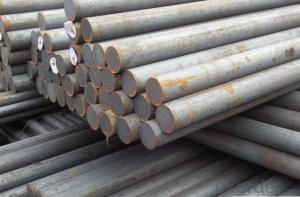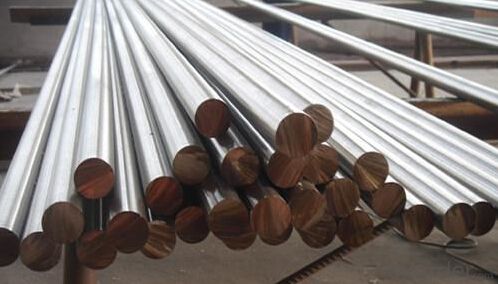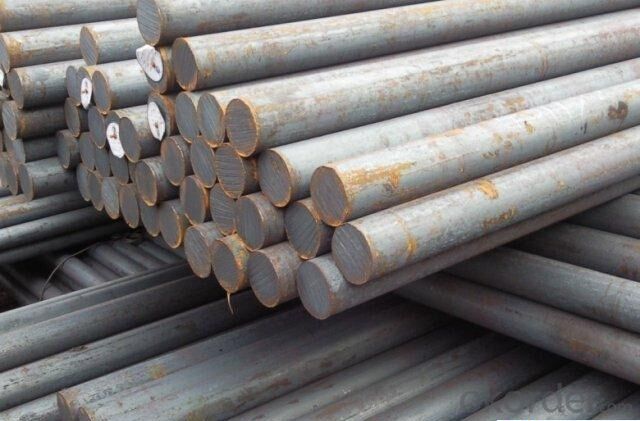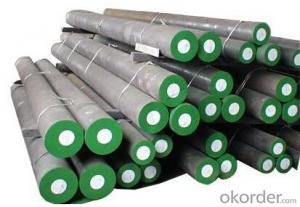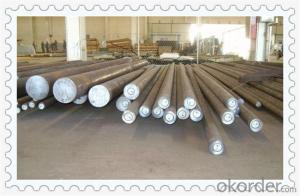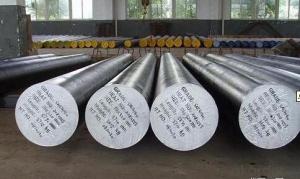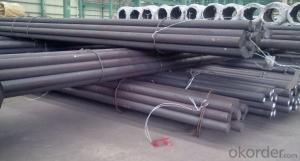Grade ASTM/AISI/SAE 5140 CNBM Alloy Steel Round Bar
- Loading Port:
- Shanghai
- Payment Terms:
- TT OR LC
- Min Order Qty:
- 20 m.t.
- Supply Capability:
- 10000 m.t./month
OKorder Service Pledge
OKorder Financial Service
You Might Also Like
Specification
Specifications:
1. Commodity: Round steel bar
2. Technical: Hot rolling
3. Length: Min. 5.8meter, according to requirement.
4.Diameter: 16mm-250mm
Chemical Composition:
Grade | C | Si | Mn | Cr | Ni | Cu | P | S |
40Cr | 0.37-0.44 | 0.17-0.37 | 0.50-0.80 | 0.80-1.10 | ≤0.30 | ≤0030 | ≤0.035 | ≤0.035 |
41Cr4 | 0.38-0.45 | ≤0.40 | 0.60-0.90 | 0.90-1.20 | ≤0.030 | ≤0.030 | ≤0.035 | ≤0.035 |
5140 | 0.38-0.43 | 0.17-0.37 | 0.70-0.90 | 0.70-0.90 | ≤0.030 | ≤0.030 | ≤0.040 | ≤0.035 |
Mechanical Property:
Grade | Tensile Strengthσb (MPa) | Yield Strength | Elongation | Reduction of Area ψ (%) | Impact Akv(J) | Hardness |
σs (MPa) | δ5 (%) | |||||
5140 | ≥980(100) | ≥785(80) | ≥9 | ≥45 | ≥47 | ≤207HB |
Usage and Applications:
Gear, Sleevesspool,Shaft, Crankshaft, Pin
Packaging & Delivery:
Packaging Detail: Standard seaworthy packing or as customer required; all goods are packed in bundle with steel strips and shipped by break bulk vessel or container
Delivery Detail: 15~45 days
Production Flow:
EAF+LF+VD+ Forged+ Heat Treatment
Material prepare (billet) — heat up — rough rolling — precision rolling — cooling — packing — storage and transportation
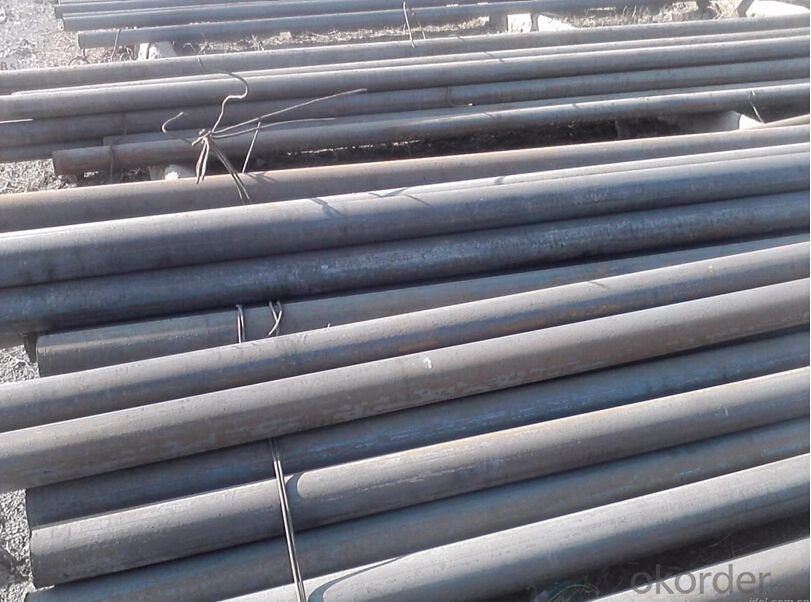
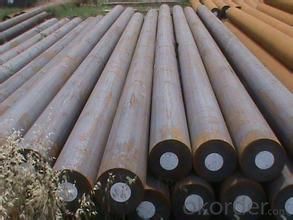
Quality Assurance:
1. We will strictly inspect our production that we sold according to the customer’s request.
2. Our steel reaches international quality standards.
3. Quality should be in conformity with the specification of the manufacturer. Quantity and packing conditions should be in conformity with the term in the contract.
4. Should the packing found damaged, the buyer has the right to claim to the seller
- Q: Can special steel be used in the appliance manufacturing industry?
- Yes, special steel can be used in the appliance manufacturing industry. Special steels, such as stainless steel or high-strength steel, offer various advantages such as corrosion resistance, durability, and enhanced mechanical properties. These qualities make them suitable for manufacturing appliances that require high performance, such as refrigerators, ovens, or washing machines. Additionally, special steels can be customized to meet specific design requirements and can contribute to the overall aesthetic appeal of the appliances.
- Q: What are the properties of wear-resistant steel?
- Wear-resistant steel possesses unique properties that make it highly resistant to abrasion and wear. It has a high hardness level, which enables it to withstand repeated impact and friction without deforming or wearing down. Additionally, wear-resistant steel exhibits excellent toughness, allowing it to absorb energy and resist cracking or breaking under harsh conditions. It also has a high strength-to-weight ratio, making it suitable for applications requiring both strength and durability. Overall, the properties of wear-resistant steel make it ideal for use in industries such as mining, construction, manufacturing, and transportation, where materials are subjected to intense wear and tear.
- Q: What are the main applications of special steel in the semiconductor industry?
- Special steel finds various applications in the semiconductor industry, primarily in the manufacturing of critical components such as chambers, wafer carriers, and vacuum systems. Due to its high strength, corrosion resistance, and thermal stability, special steel is ideal for creating these parts that require durability and precision in maintaining the controlled environments necessary for semiconductor production. Additionally, special steel is also used in the fabrication of cutting tools and molds for semiconductor device manufacturing, further highlighting its importance in this industry.
- Q: What are the different types of tool steel?
- There are several different types of tool steel, including high-speed steel, cold work steel, hot work steel, and plastic mold steel. Each type of tool steel is specifically designed for different applications and has unique properties that make it suitable for specific tasks.
- Q: What is the significance of vanadium in special steel?
- Vanadium is significant in special steel because it helps improve the steel's strength, toughness, and corrosion resistance. It forms strong carbides, which contribute to the steel's hardness and wear resistance. Additionally, vanadium helps refine the steel's grain structure, resulting in improved toughness and impact resistance. Overall, vanadium enhances the performance and durability of special steel, making it suitable for demanding applications in industries such as aerospace, automotive, and tooling.
- Q: How does special steel contribute to the aerospace material cost reduction?
- Special steel contributes to the aerospace material cost reduction by offering superior strength, durability, and corrosion resistance properties. This allows for the design and manufacture of lighter and more fuel-efficient aircraft components. Additionally, special steel's high performance characteristics enable longer service life, reducing maintenance and replacement costs over time.
- Q: What are the requirements for special steel used in telecommunications infrastructure?
- The requirements for special steel utilized in telecommunications infrastructure encompass several aspects: 1. Elevated strength: To withstand the substantial loads and stresses imposed on the structures, it is essential for the special steel employed in telecommunications infrastructure to possess a high tensile strength. This guarantees the stability and security of the infrastructure. 2. Resistance to corrosion: Given the potential exposure to diverse environmental conditions such as moisture and chemicals, it is of utmost importance for the special steel to exhibit exceptional corrosion resistance. This safeguard protects the infrastructure from rust and deterioration, thereby extending its lifespan. 3. Favorable weldability: The special steel employed in telecommunications infrastructure should possess good weldability to facilitate the construction and installation processes. This enables the seamless joining of various components, thereby ensuring a sturdy and dependable structure. 4. Durability: The special steel must demonstrate the ability to endure the harsh conditions it may face throughout its lifetime. It should exhibit high durability to resist fatigue, impact, and other external factors that could potentially compromise the integrity of the infrastructure. 5. Lightweight nature: In addition to strength, special steel utilized in telecommunications infrastructure should also possess a lightweight quality. This characteristic enables easier transportation, handling, and installation of the components, thereby reducing costs and construction time. 6. Fire resistance: The special steel utilized in telecommunications infrastructure should possess commendable fire resistance properties to prevent the spread of fire and ensure the safety of the infrastructure and its surroundings. 7. Electrical conductivity: Telecommunications infrastructure often necessitates electrical grounding and bonding. Consequently, the special steel employed in these applications should exhibit favorable electrical conductivity properties to ensure effective grounding and minimize electrical interference. Meeting these requirements guarantees that the special steel employed in telecommunications infrastructure can provide the necessary structural integrity, longevity, and performance required to support reliable and efficient communication networks.
- Q: Can special steel be used for making renewable energy equipment?
- Yes, special steel can be used for making renewable energy equipment. Special steel, also known as high-performance or alloy steel, offers a range of properties that make it suitable for use in various renewable energy applications. For example, in wind energy, special steel can be used to manufacture wind turbine components such as rotor blades, tower structures, and drive train systems. The high strength and corrosion resistance of special steel ensure the durability and longevity of these components, which are exposed to harsh weather conditions and continuous mechanical stress. In solar energy, special steel can be utilized in the construction of solar panels, support structures, and tracking systems. The material's excellent thermal conductivity and resistance to deformation make it ideal for efficiently capturing and converting solar energy into electricity. Additionally, special steel can be employed in the production of hydroelectric power equipment, such as turbine blades, runners, and penstocks. Its high tensile strength and resistance to erosion and cavitation enable these components to withstand the forces and pressures associated with water power generation. Furthermore, when it comes to biomass energy, special steel can be used in the fabrication of bioenergy plants and equipment. Its heat resistance and corrosion properties make it suitable for handling high temperatures and corrosive substances involved in the biomass conversion process. Overall, special steel's unique combination of strength, durability, corrosion resistance, and thermal properties make it an excellent choice for manufacturing renewable energy equipment, contributing to the development and sustainability of the renewable energy industry.
- Q: What are the requirements for special steel used in aerospace defense applications?
- Due to the critical nature of aerospace defense applications, the demands for special steel are highly rigorous. The steel must meet several key requirements: 1. Exceptional strength is necessary to withstand extreme conditions and loads, ensuring the structural integrity of aircraft and defense equipment. 2. The steel must have excellent corrosion resistance to combat the harsh environments it encounters, such as moisture, saltwater, and chemicals. This prevents degradation and maintains performance over time. 3. Withstanding high temperatures without compromising mechanical properties is crucial for components operating in high-temperature environments, like jet engines and rocket nozzles. 4. Fatigue resistance is essential as aerospace defense applications involve repeated stress cycles. The steel should be able to resist fatigue failure, ensuring long service lives without failure. 5. Weight reduction is a critical factor to enhance fuel efficiency, payload capacity, and overall performance. The special steel must have a high strength-to-weight ratio, allowing for lighter structures without compromising strength. 6. To ensure reliability and longevity in demanding operational conditions, the steel used must have a high level of purity and cleanliness, minimizing the presence of impurities and defects. 7. Compatibility with other materials, such as aluminum alloys and composite materials commonly used in aerospace defense applications, is essential for reliable and efficient integration of different components and structures. Meeting these requirements often involves utilizing advanced manufacturing techniques such as vacuum melting, precise alloying, and heat treatment processes. Additionally, strict quality control measures, including non-destructive testing and material certification, are crucial to guarantee the performance and reliability of special steel in aerospace defense applications.
- Q: How does special steel perform under low temperatures?
- Special steel performs well under low temperatures due to its high strength, toughness, and resistance to brittle fracture. It retains its mechanical properties and does not become brittle like other materials, making it suitable for applications in cold environments.
Send your message to us
Grade ASTM/AISI/SAE 5140 CNBM Alloy Steel Round Bar
- Loading Port:
- Shanghai
- Payment Terms:
- TT OR LC
- Min Order Qty:
- 20 m.t.
- Supply Capability:
- 10000 m.t./month
OKorder Service Pledge
OKorder Financial Service
Similar products
Hot products
Hot Searches
Related keywords

